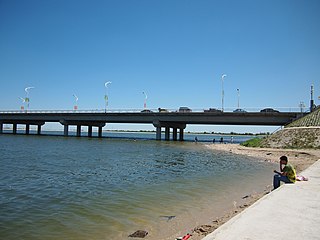The Mongols are an East-Central Asian ethnic group native to Mongolia and to China's Inner Mongolia Autonomous Region. They also live as minorities in other regions of China, as well as in Russia. Mongolian people belonging to the Buryat and Kalmyk subgroups live predominantly in the Russian federal subjects of Buryatia and Kalmykia.

Inner Mongolia or Nei Mongol, officially the Inner Mongolia Autonomous Region or Nei Mongol Autonomous Region (NMAR), is one of the autonomous regions of the People's Republic of China, located in the north of the country. Its border includes most of the length of China's border with Mongolia. The rest of the Sino–Mongolian border coincides with part of the international border of the Xinjiang autonomous region and the entirety of the international border of Gansu province and a small section of China's border with Russia. Its capital is Hohhot; other major cities include Baotou, Chifeng, and Ordos.

The Tuvan People's Republic (or People's Republic of Tannu Tuva; Tuvan: Тыва Арат Республик, translit. Tıwa Arat Respublik; Uniform Turkic Alphabet: Tьva Arat Respuʙlik, IPA: [tʰɯˈʋa aˈɾatʰ resˈpʰuplik]; 1921–1944; was a partially recognized independent state in the territory of the former Tuvan protectorate of Imperial Russia also known as Uryankhaisky Krai.

The Mongolian People's Republic, was a unitary sovereign socialist state which existed between 1924 and 1992, coterminous with the present-day country of Mongolia in East Asia. It was ruled by the Mongolian People's Revolutionary Party and maintained close links with the Soviet Union throughout its history. Geographically, it was bordered by China to its south and the Soviet Union to its north.
The Association for Relations Across the Taiwan Straits is an organization set up by the People's Republic of China for handling technical or business matters with the Republic of China (Taiwan).

Chen Deming is a former the President of Association for Relations Across the Taiwan Straits of the People's Republic of China.

Tongliao is a prefecture-level city in eastern Inner Mongolia, People's Republic of China. The area is 59,535 square kilometres (22,987 sq mi) and population is 3,139,153 ; the city proper has 898,895 inhabitants (2010). The city was the administrative centre of the defunct Jirem League.

UTC+08:00 is an identifier for a time offset from UTC of +08:00. In ISO 8601 the associated time would be written as 2019-02-07T23:28:34+08:00.

Chinese Mongols are citizens of the China who are ethnic Mongols. They form one of the 55 ethnic minorities officially recognized by the People's Republic of China. There are approximately 5.8 million people classified as ethnic Mongols living in China. Most of them live in Inner Mongolia, Northeast China, Xinjiang, etc. The Mongol population in China is over twice that of the sovereign state of Mongolia.

The Eurasian Steppe, also called the Great Steppe or the steppes, is the vast steppe ecoregion of Eurasia in the temperate grasslands, savannas, and shrublands biome. It stretches from Bulgaria, Romania and Moldova through Ukraine, Russia, Kazakhstan, Xinjiang, and Mongolia to Manchuria, with one major exclave, the Pannonian steppe or Puszta, located mostly in Hungary and partially in Serbia and Croatia.

Bayannur or Bayannao'er is a prefecture-level city in western Inner Mongolia, People's Republic of China. Until December 1, 2003, the area was called Bayannur League.

Genghis Khan was the founder and first Great Khan of the Mongol Empire, which became the largest contiguous empire in history after his death. He came to power by uniting many of the nomadic tribes of Northeast Asia. After founding the Empire and being proclaimed "Genghis Khan", he launched the Mongol invasions that conquered most of Eurasia. Campaigns initiated in his lifetime include those against the Qara Khitai, Caucasus, and Khwarazmian, Western Xia and Jin dynasties. These campaigns were often accompanied by large-scale massacres of the civilian populations – especially in the Khwarazmian and Western Xia controlled lands. By the end of his life, the Mongol Empire occupied a substantial portion of Central Asia and China.

Chen Yunlin was the chairman of the Association for Relations Across the Taiwan Straits (ARATS), the body responsible for negotiations with Taiwan in the People's Republic of China in 2008-2013.

Wa'arat al-Sarris was a Palestinian village in the Haifa Subdistrict, which was depopulated during the 1948 Palestine war.

Shirnengiin Ayuush was a Mongolian composer, novelist and art historian, one of the leading composers of Mongolia in the 1930s.

Arat Bon is a village in Valupey Rural District, in the Central District of Savadkuh County, Mazandaran Province, Iran. At the 2006 census, its population was 253, in 84 families.

The Mongolian Arat squadron was a fighter squadron in the Soviet Air Force, funded by contributions from the Mongolian People's Republic. It was operational during World War II and the Cold War. The Mongolian word "ard" (ард) means "people", but was malapropriated in Russian and other languages as "Arat" (арат) to mean a nomadic pastoralist or herdsman.

Outer Mongolia—officially the Mongolian People's Republic—was ruled by the communist government of Khorloogiin Choibalsan during World War II and was closely linked to the Soviet Union. Mongolia, with less than a million inhabitants, was considered a breakaway province of the Republic of China by most nations. Until 1945, Mongolia kept formal neutrality. Throughout the war with Germany, the country provided the Soviet Union with economic support, such as livestock, raw materials, money, food and military clothing. Mongolia was one of two Soviet satellites not generally recognised as sovereign nations at the time, the other being the Tuvan People's Republic; both participated in World War II.

Ard Ayush (Mongolian: Ард Аюуш, full name: Алдаржавын Аюуш was the leader of an Arat rebellion in southwestern Khovd Province from 1903 until 1917.



















